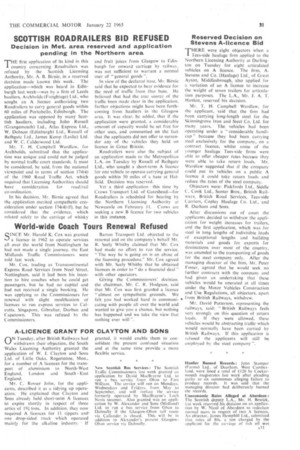Reserved Decision on Stevens . A-licence Bid
Page 33

If you've noticed an error in this article please click here to report it so we can fix it.
THERE were eight objectors when a 4 Tees-side haulage firm applied to the Northern Licensing Authority at Darlington on Tuesday for eight articulated vehicles on A licence. The firm, A. Stevens and Co. (Haulage) Ltd., of Great Ayton, Middlesbrough, also applied for a variation of an A licence to increase the weight of seven trailers for articulation purpbses. The L.A., Mr. J. A. T. Hanlon, reserved his decision.
Mr. T. H. Campbell Wardlaw, for the applicant, said that the firm had been carrying long-length steel for the Skinningrove Iron and Steel Co. Ltd. for many years. The vehicles had been operating under a "considerable handicap " because they had been carrying steel exclusively for the company, on a contract licence, whilst some of the younger haulage Tees-side firms were able to offer cheaper rates becaise they were able to take return loads. Mr. Wardlaw suggested that if the company could put ' its vehicles on a public A licence it could take return loads and t educe the rates of the steel eompany.
Objectors were: Pickfords Ltd., Siddle C. Cook Ltd., Sunter Bros., British Railways, British Road Services, Tees-side Carriers, Copley Haulage Co. Ltd., and R. Durham and Sons.
After discussions out of court the applicants decided to withdraw the application for weight increases for trailers, and the first application, which was for steel in long lengths of indivisible loads of exceptional lengths and building materials and goods for exports for destinations over most of the country, was amended to the transporting of goods for the steel company only. After the managing director of the firm, Mr. Peter Foster, agreed that he would seek no further contracts with the company and had given an undertaking that these vehicles would be operated at all times under the Motor Vehicles Construction and Use Regulations, all objectors, apart ,,, from British Railways, withdrew.
Mr. David Patterson, representing the railways, said: " British Railways feels very strongly on this question of return loads. If they were allowed, these vehicles would be abstracting traffic which would normally have been carried by British Railways. If this application is refused the applicants will still be employed by the steel company ".




















































































































